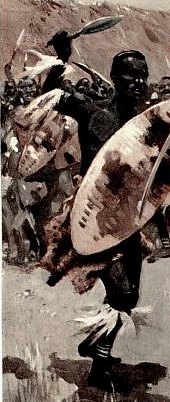
Impi is a Nguni word meaning war or combat and by association any body of men gathered for war, for example impi ya masosha is a term denoting an army. Impi were formed from regiments from large militarised homesteads. In English impi is often used to refer to a Zulu regiment, which is called an ibutho in Zulu or the army.

Shaka kaSenzangakhona, also known as Shaka Zulu and Sigidi kaSenzangakhona, was the king of the Zulu Kingdom from 1816 to 1828. One of the most influential monarchs of the Zulus, he ordered wide-reaching reforms that reorganized the military into a formidable force.
Nandi KaBhebhe was a daughter of Bhebhe, a past Elangeni chief and the mother of Shaka kaSenzangakhona, King of the Zulus.
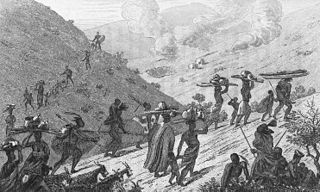
The Mfecane, also known by the Sesotho names Difaqane or Lifaqane, is a historical period of heightened military conflict and migration associated with state formation and expansion in Southern Africa. The exact range of dates that comprise the Mfecane varies between sources. At its broadest, the period lasted from the late eighteenth century to the mid-nineteenth century, but scholars often focus on an intensive period from the 1810s to the 1840s. The concept first emerged in the 1830s and blamed the disruption on the actions of Shaka Zulu, who was alleged to have waged near-genocidal wars that depopulated the land and sparked a chain reaction of violence as fleeing groups sought to conquer new lands. Since the latter half of the 20th century, this interpretation has fallen out of favor among scholars due to a lack of historical evidence.
King Senzangakhona kaJama was the king of the Zulu Kingdom, and primarily notable as the father of three Zulu kings who ruled during the period when the Zulus achieved prominence, led by his oldest son King Shaka.
King Jama kaNdaba, the son of Ndaba kaMageba, was king of the Zulu Kingdom from 1763 to 1781. It is alleged he prophesied the birth of King Shaka. His grandfather was King Mageba kaGumede.

The Ndwandwe–Zulu War of 1817–1819 was a war fought between the expanding Zulu Kingdom and the Ndwandwe tribe in South Africa.
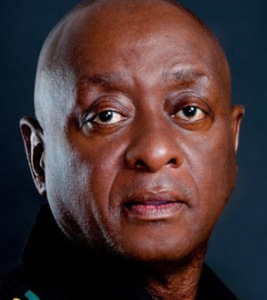
Mbongeni Ngema was a South African playwright, lyricist, composer, director, choreographer, and theatre producer, best known for co-writing the 1981 play Woza Albert! and co-writing the 1988 musical Sarafina!. He was known for plays that reflected the spirit of black South Africans under apartheid, and won much praise for his work, but was also the subject of several controversies. He died in a car accident on 27 December 2023.
Zwide kaLanga (1758–1825) was the king of the Ndwandwe (Nxumalo) nation from about 1805 to around 1820. He was the son of Langa KaXaba, a Nxumalo king.

Benedict Wallet Vilakazi was a South African novelist, linguist, a descendant of the Zulu royal family, and a radically innovative poet who created a combination of traditional and Romantic poetry in the Zulu language. Vilakazi was also a professor at the University of Witwatersrand, where he became the first Black South African to teach University classes to White South Africans. In 1946, Vilakazi also became the first Black South African to receive a PhD.
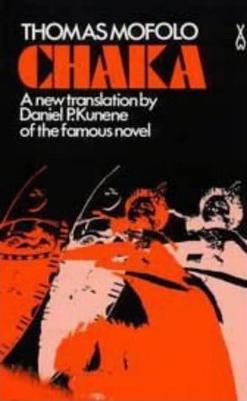
Chaka is the third and final novel by Lesotho writer Thomas Mofolo. Written in Sesotho, it is a mythic fictional retelling of the story of the rise and fall of the Zulu emperor-king Shaka. Following its first publication in 1925, it was published in English translation in 1931.
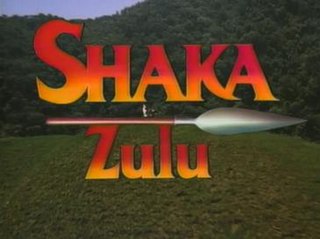
Shaka Zulu is a 1986 South African television series directed by William C. Faure and written by Joshua Sinclair for the South African Broadcasting Corporation (SABC), based on his 1985 novel of the same name.
The Zulu royal family, also known as the House of Zulu consists of the king of the Zulus, his consorts, and all of his legitimate descendants. The legitimate descendants of all previous kings are also sometimes considered to be members.
Mazisi (Raymond) Kunene was a South African poet best known for his translation of the epic Zulu poem Emperor Shaka the Great. While in exile from South Africa's apartheid regime, Kunene was an active supporter and organiser of the anti-apartheid movement in Europe and Africa. He later taught at the University of California, Los Angeles, and become Africa's and South Africa's first poet laureate.

Euphorbia cupularis, referred to by the common name dead-man's tree is a succulent tree or shrub of the spurge family, Euphorbiaceae. It is found in South Africa and Eswatini.

The Mthethwa Paramountcy, sometimes referred to as the Mtetwa or Mthethwa Empire, was a Southern African state that arose in the 18th century south of Delagoa Bay and inland in eastern southern Africa. "Mthethwa" means "the one who rules".

The Zulu Kingdom, sometimes referred to as the Zulu Empire or the Kingdom of Zululand, was a monarchy in Southern Africa. During the 1810s, Shaka established a standing army that consolidated rival clans and built a large following which ruled a wide expanse of Southern Africa that extended along the coast of the Indian Ocean from the Tugela River in the south to the Pongola River in the north.
Sigujana kaSenzangakhona was King of the Zulu people in 1816. He was the son of Senzangakhona kaJama and half-brother of Dingane kaSenzangakhona and Shaka kaSenzangakhona. He succeeded his father c. 1816. His mother was Bhibhi kaSompisi. Shortly after he became chief, he was murdered by his half-brother, Shaka. It is disputed whether Shaka had him assassinated, or Shaka himself killed Sigujana by stabbing him. His birth date is unknown, but he died in 1816, shortly after he had become King.
Princess Mkabayi kaJama was a Zulu princess, the head of the Qulusi military kraal, and a regent of the Zulu Kingdom. She persuaded her father, the Zulu King Jama kaNdaba, to remarry, and acted as a regent during the reign of her half-brother, Senzangakhona.










